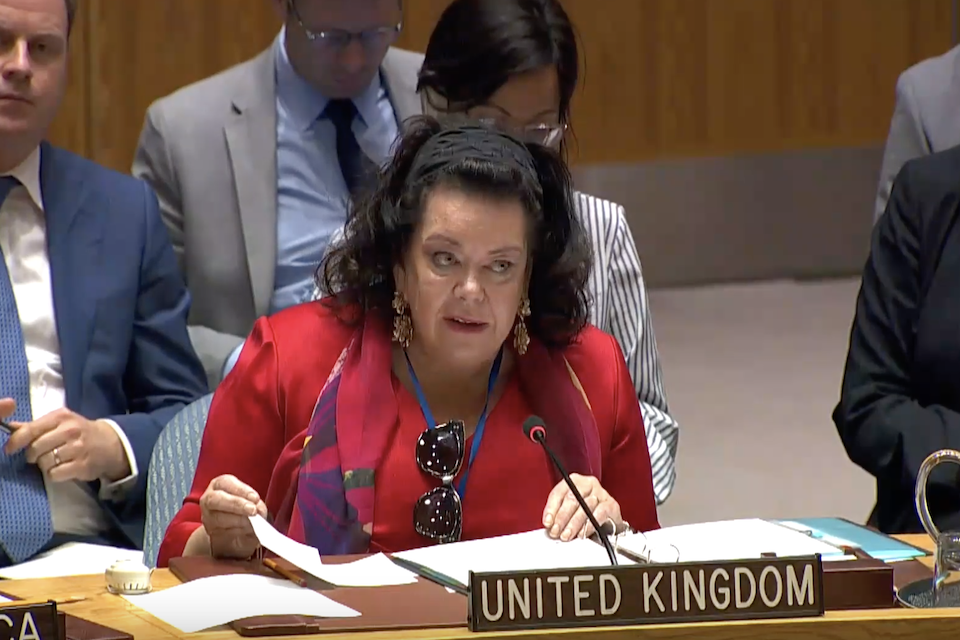We need answers for the people of Idlib
Statement by Ambassador Karen Pierce, UK Permanent Representative to the UN, at the Security Council briefing on Syria

Statement by Ambassador Karen Pierce, UK Permanent Representative to the UN, at the Security Council briefing on Syria Thursday, 17 May
Thank you very much Mr President. Thank you to our briefers. I want to start Mr President, we’ll hear from Turkey later but I wanted to start by welcoming Turkey’s efforts to agree the Sochi ceasefire last September. Just as we welcome that then, so we welcome now their efforts to restore that ceasefire and de-escalate. I think we heard very clearly from both Under-Secretaries General why that is a matter of urgency. Thank you to Kuwait for calling this meeting which is clearly needed.
Mr President the situation in Idlib is so dire that I won’t repeat our well-known position on the political process which has not changed nor indeed on chemical weapons, likewise. I want to use this session to focus purely on Idlib, the nightmare in Idlib and the slaughter that’s happening in Idlib. Mr Lowcock asked a number of questions, as he said more questions than answers. It would be good Mr President, to get some answers for the people of Idlib from this session today.
As we’ve heard, the regime offensive in northwest Syria has left 180,000 people displaced since 28 April alone and many killed and wounded. Since that date, at least 18 health facilities including nine primary health care centres, nine hospitals and 17 schools have been hit by airstrikes. That’s a clear violation of SCR 2286 and International Humanitarian Law. And as the Belgian Ambassador explained, where do we see Mr President what has happened to the principles of proportionality, distinction and necessity?
What is necessary Mr President? What is proportionate about bombing 18 health facilities with the devastating effect on the local population that the Under-Secretary General outlined. I was interested Mr President, in Mr Lowcock’s confirmation that the UN does provide details of the locations of hospitals to the parties to the conflict and I note with grave concern the International Humanitarian Law obligations that he cites which should not be taken lightly. He asked the question; Who is bombing these hospitals? Whoever it is has a modern air force and precision weapons. And are the hospitals and other facilities being deliberately targeted despite the de-confliction mechanisms? Mr President, it would be absolutely grotesque if NGOs and health workers providing coordinates to a mechanism they believe is there to assure their safety were finding themselves being the authors of their own destruction because of deliberate targeting by the regime. But I’d like to know Mr President, I’d like to know since we know that Russia and Syria are the only countries that fly planes in the area, is the answer to Mr. Lowcock’s questions the Russian and Syrian air forces? I think we need answers Mr President today, and if the answer is the Russian and Syrian air forces, I call on both Ambassadors here today to give us an assurance that the attacks will stop, and there will be no more deliberate targeting of civilians in this manner in facilities that every single member of the international community has a duty to protect.
The Belgian Ambassador also referred to the fact that CT (counterterrorist operations) are not a license for indiscriminate attacks on civilians. And I just want to underscore that point as well Mr President. It’s in the Geneva Conventions. It’s a central doctrine of International Humanitarian Law; proportionality, distinction and necessity really matter and they don’t seem to be in evidence in Idlib.
Mr President, Russia has claimed that its so-called retaliatory strikes in support of the regime were surgical - I quote - surgical in their precision.
Mr President I hope I do not need medical treatment in Moscow if surgical accuracy means what we’ve seen on the ground in Idlib.
So either these statements or the strikes are wildly inaccurate. Mr President, Russia must ensure that its own forces and those of its ally in Damascus strictly abide by International Humanitarian Law and the agreements and resolutions that as a member of the international community, as a P5 member, it has agreed. There’s one other question that struck me Mr President from the Under-Secretary General; Why aren’t the resolutions being complied with? I think that’s a very good question. I think every parent in Idlib has the right to know the answer to that question. It’s not a $64,000 question Mr. President, to use a vernacular phrase. It’s a question that’s costing 160 lives in Idlib and 400,000 lives since the conflict in Syria began. Thank you.